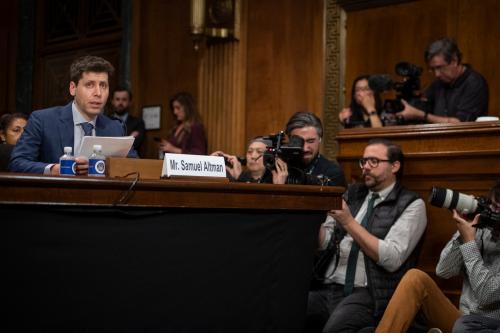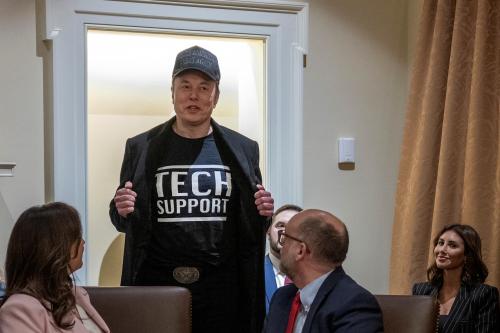On October 30, the White House released a detailed and comprehensive executive order on AI (EOAI)—the Executive Order on Safe, Secure, and Trustworthy Artificial Intelligence. The EOAI mobilizes the federal government to develop guidelines and principles, and compile reports on AI use and its development. The EOAI, along with the AI Bill of Rights, the Voluntary AI Commitments, and work on AI standards sum to an increasingly coherent and comprehensive approach to AI governance. U.S. leadership on AI governance is critical, particularly given the role of the U.S. as a leading developer and investor in AI, including more recently foundational AI models such as ChatGPT4. However, international cooperation on AI governance is also needed to make domestic AI governance efforts more effective, including by facilitating the exchange of AI governance experiences that can inform approaches to domestic AI governance; addressing the externalities and extraterritorial impacts of domestic AI governance that can otherwise stifle innovation and reduce opportunities for uptake and use of AI; and finding ways to broaden access globally to the computing power and data that is essential for building and training AI models.
The EOAI along with the other domestic AI policies outlined will have significant international impacts through various channels.
First and most immediately, these suites of domestic policy developments on AI governance give Vice President Kamala Harris as head of the U.S. delegation to the U.K. AI Safety Summit a real opportunity to lead the further development of international AI governance. The U.S. position on AI stands in stark contrast to the lack of strong U.S. leadership on privacy regulation, where the absence of federal privacy legislation created a vacuum that the EU’s General Data Protection Regulation (GDPR) filled, allowing GDPR to become a leading model for privacy regulation worldwide.
Second, much of what the U.S. ends up doing in terms of domestic AI governance will influence international AI outcomes. For example, the White House Voluntary AI Commitments have become the basis for the International Code of Conduct for Organizations Developing Advanced AI Systems released by the G7 on October 30.
Third, the raft of new AI standards and guidelines across the federal government that the EOAI mandates will influence how governments and industries across the world approach AI governance. This will happen as the sheer size of the U.S. government procurement market incentivizes companies to converge on the U.S. AI standards and guidelines. Moreover, it is likely that many of these AI standards will be further developed and internationalized through more formal AI standards-setting processes in global standards development bodies such as the ISO/IEC.
The U.S., thankfully, is not alone in pushing ahead on domestic forms of AI governance. For instance, the EU AI Act is close to being finalized and countries such as Brazil, the U.K., Canada, and Japan are all developing their own approaches to AI governance. While domestic AI governance is where addressing risks from AI and developing AI’s social and economic potential must begin, these domestic efforts are building blocks to international AI governance. The work of the Brookings/CEPS Forum on Cooperation in AI (FCAI)—a track 1.5 multistakeholder dialogue—has over the last three-plus years been focused on identifying opportunities for international cooperation on AI, and this work is now even more pressing in light of the pace and scope of domestic AI governance mechanisms being developed globally. The EOAI helps here by tasking the Departments of State and Commerce to “establish robust international frameworks for harnessing AI benefits and managing its risks and ensuring safety.” The EOAI also calls for the accelerated development of AI standards with international partners in standards organizations.
AI governance has been a focus of discussions in the G7, the U.S.-EU Trade and Technology Council, and the Global Partnership on AI (GPAI). Going forward, even more intensive engagement is needed through these international forums, in FCAI, as well as progress in developing international AI standards. Expanding commitments in trade agreements and digital economy agreements is another opportunity to build the needed international cooperation on AI governance.
The Brookings Institution is committed to quality, independence, and impact.
We are supported by a diverse array of funders. In line with our values and policies, each Brookings publication represents the sole views of its author(s).







Commentary
Toward international cooperation on AI governance—the US executive order on AI
November 1, 2023